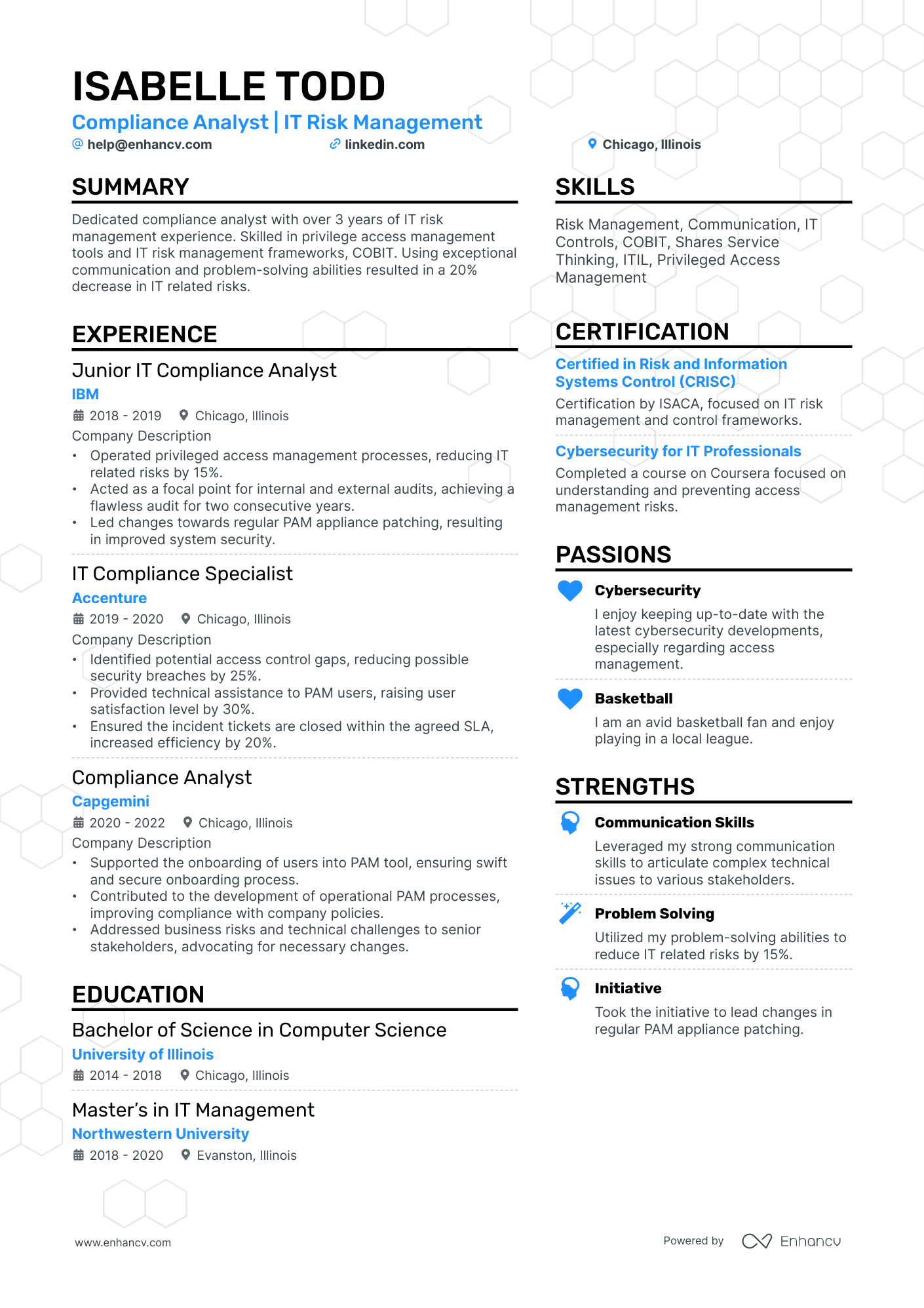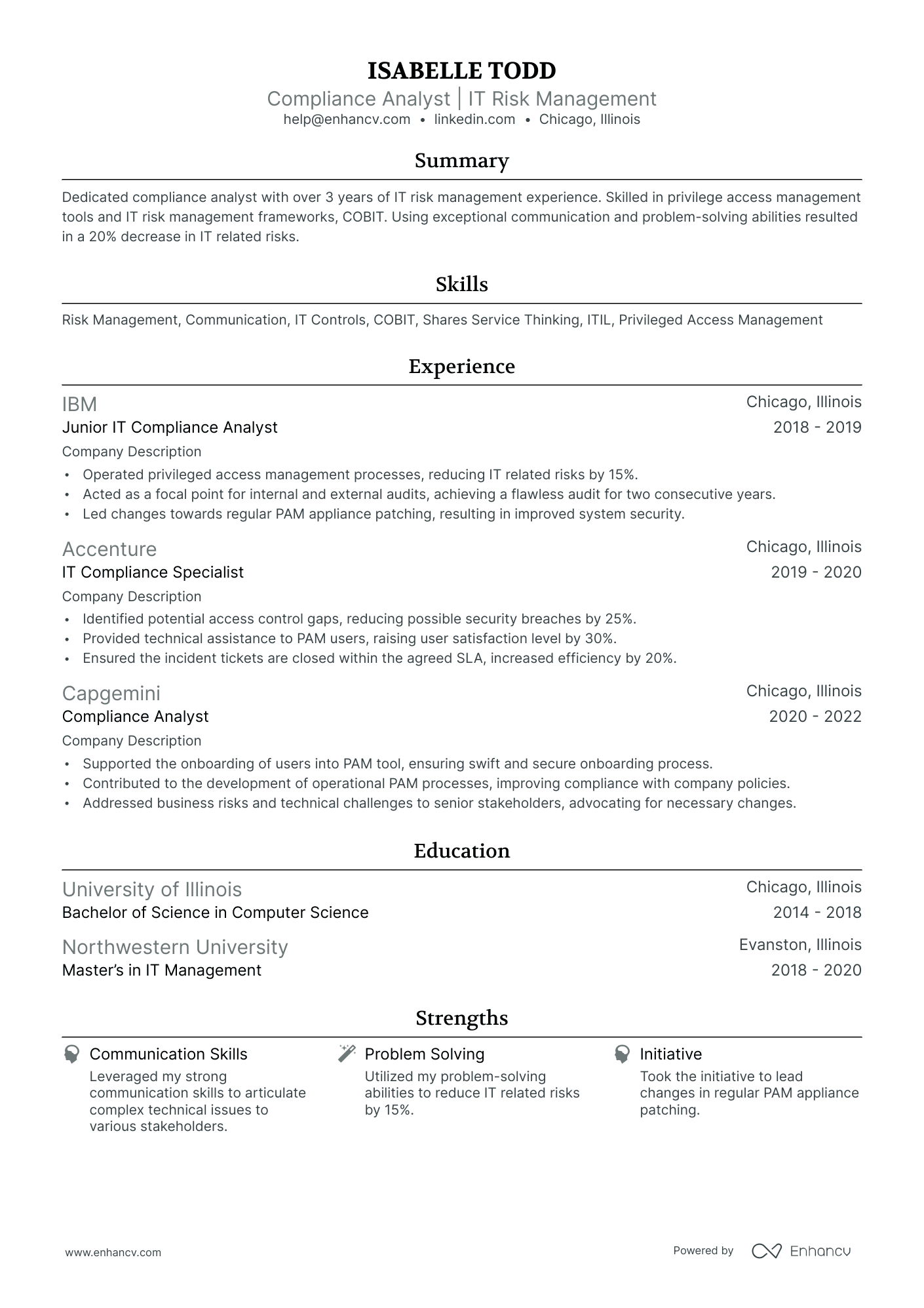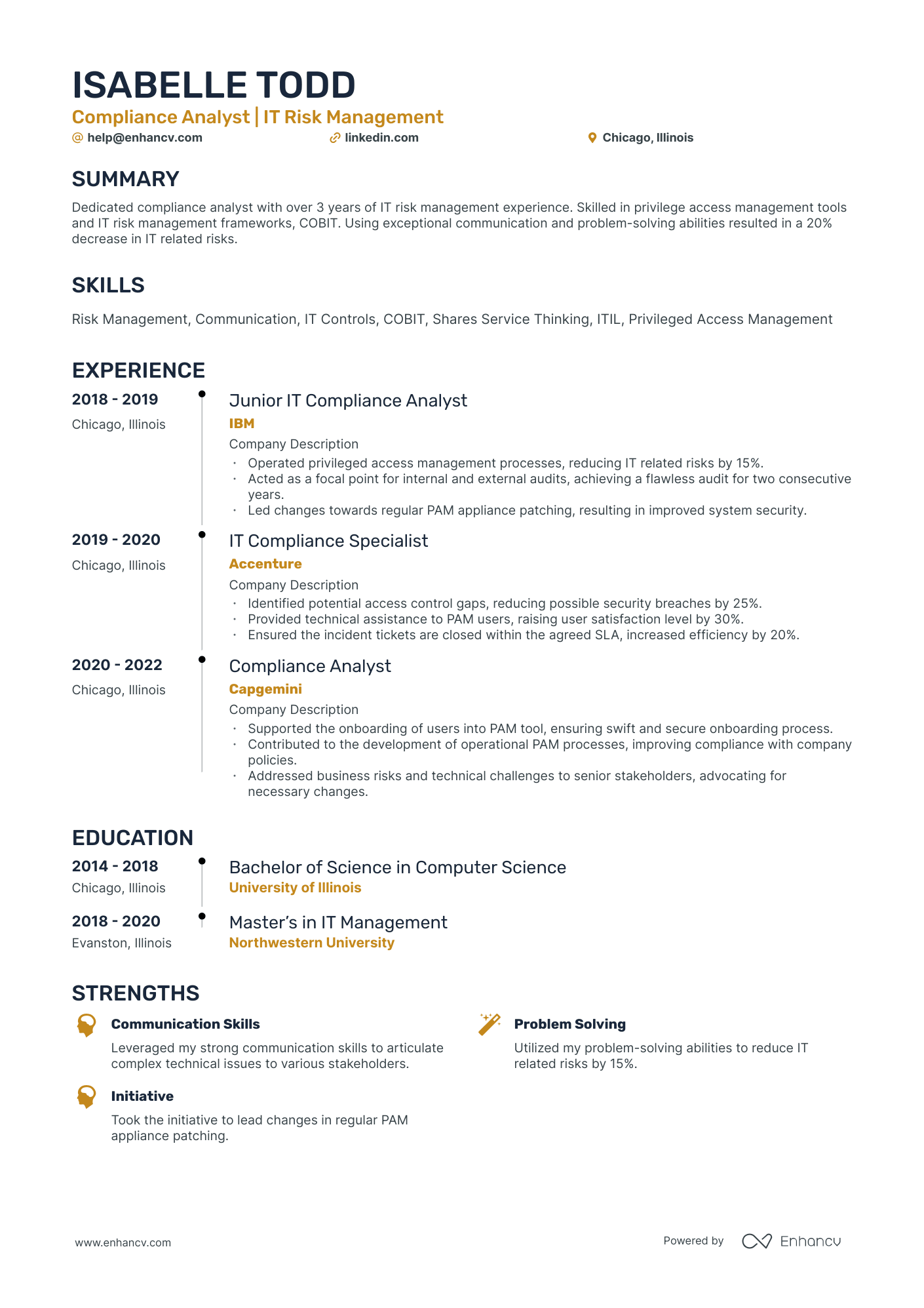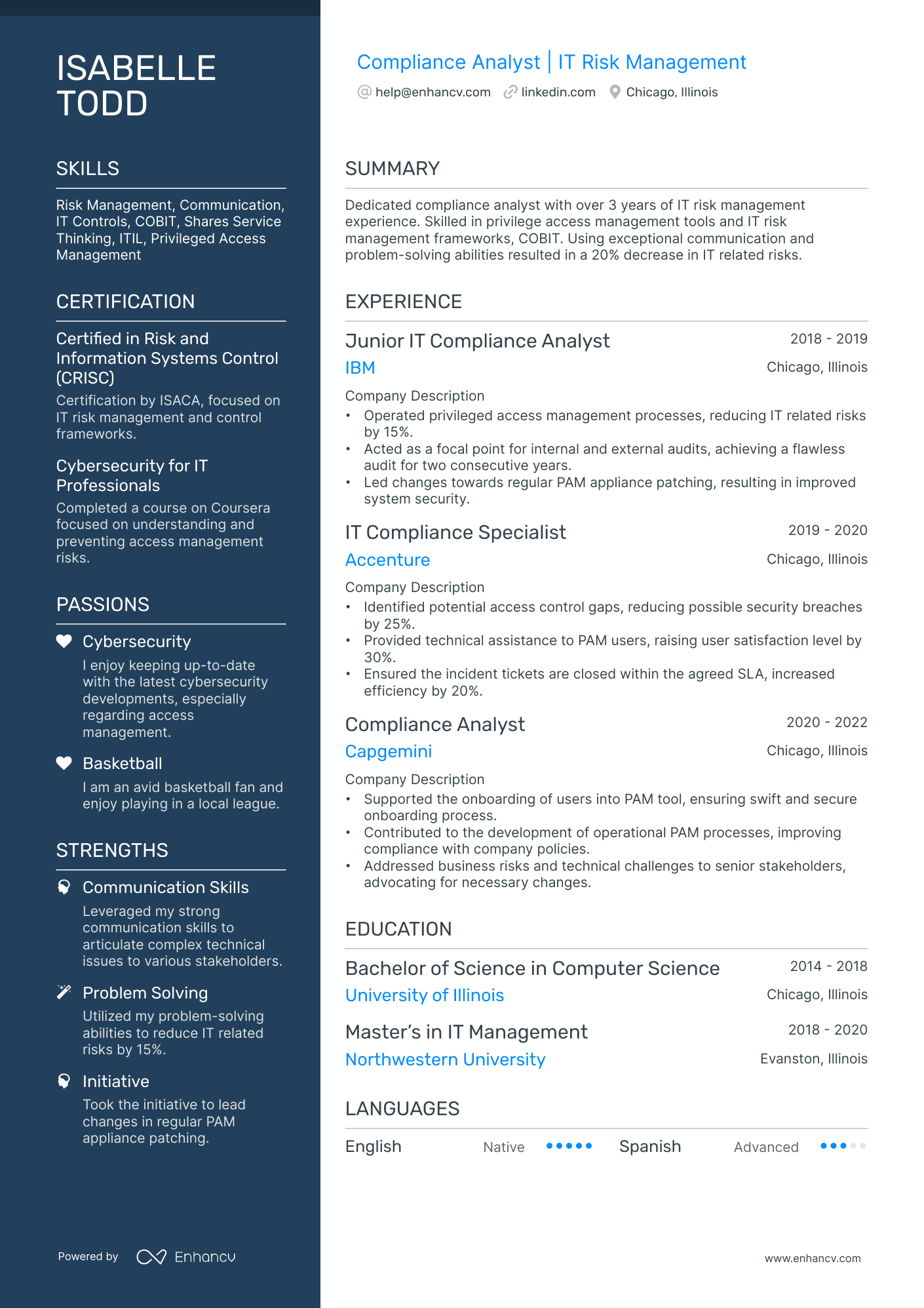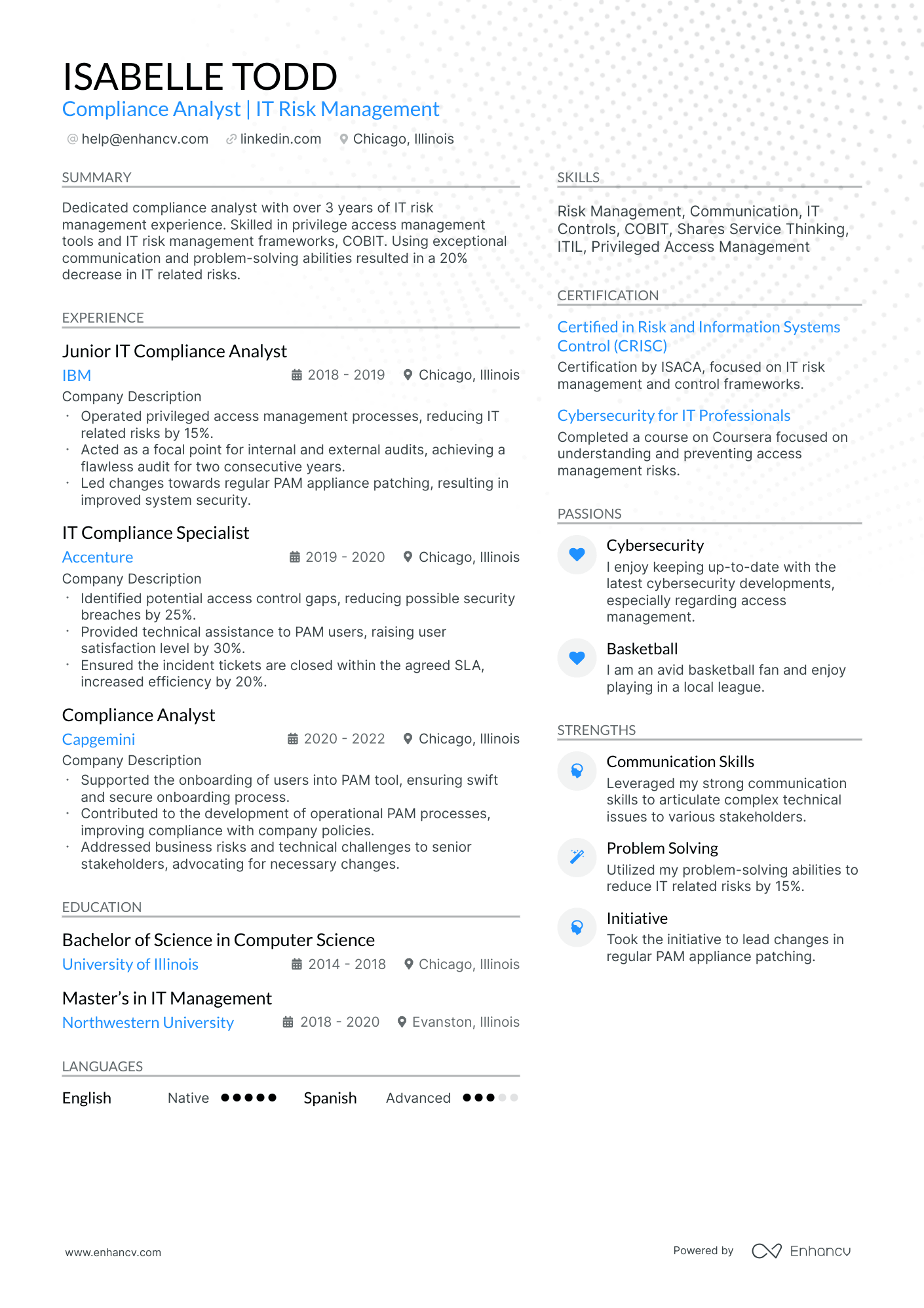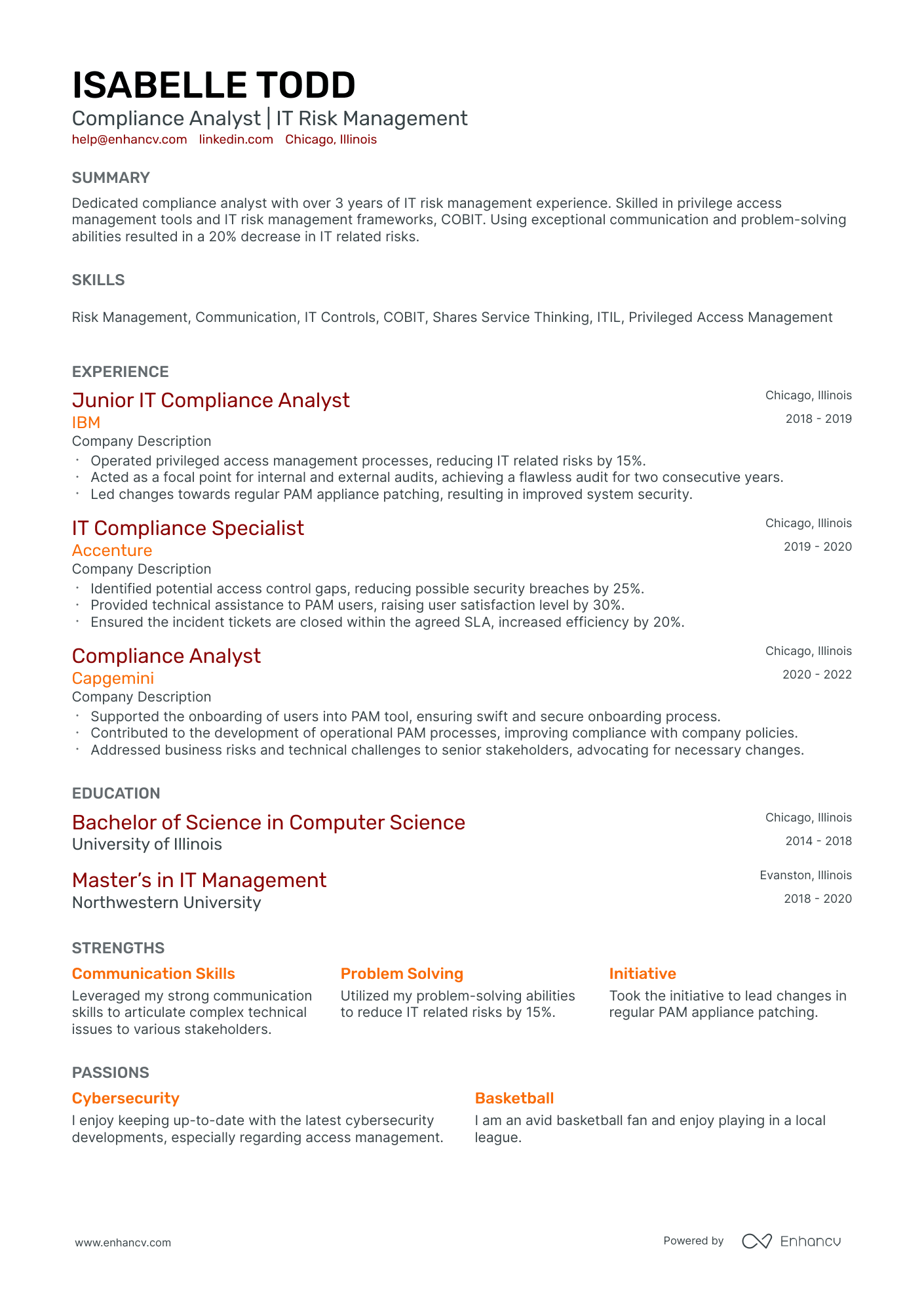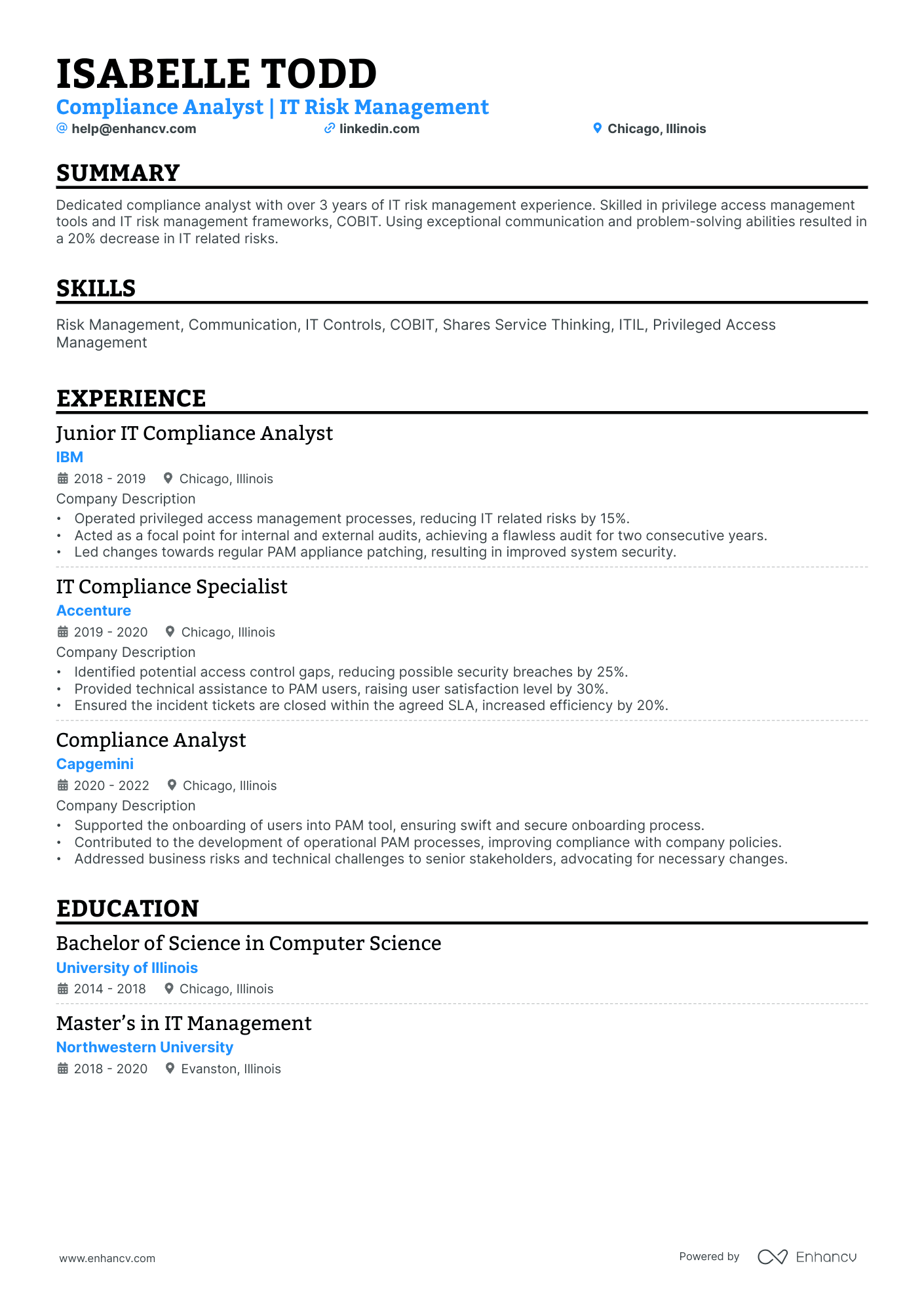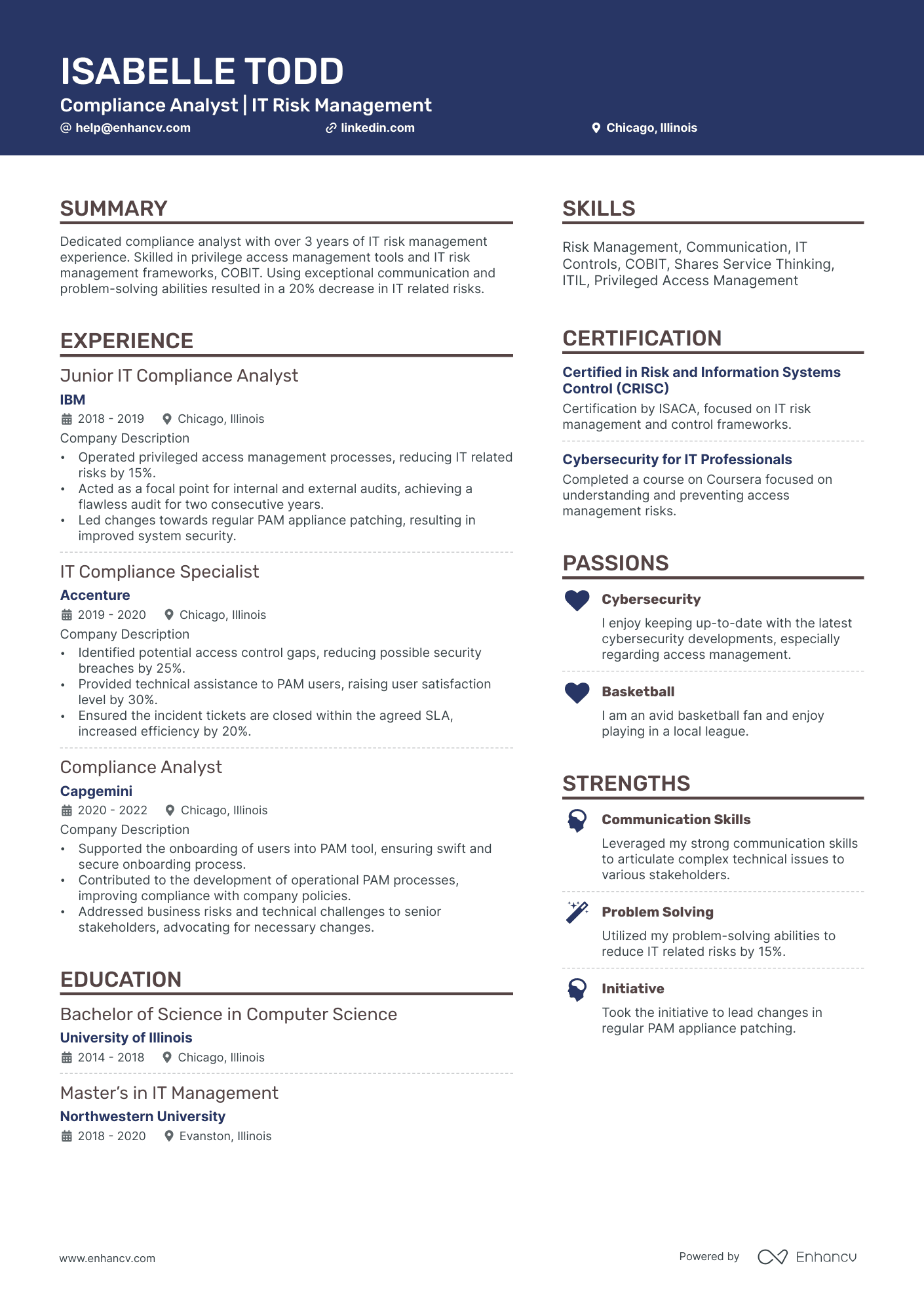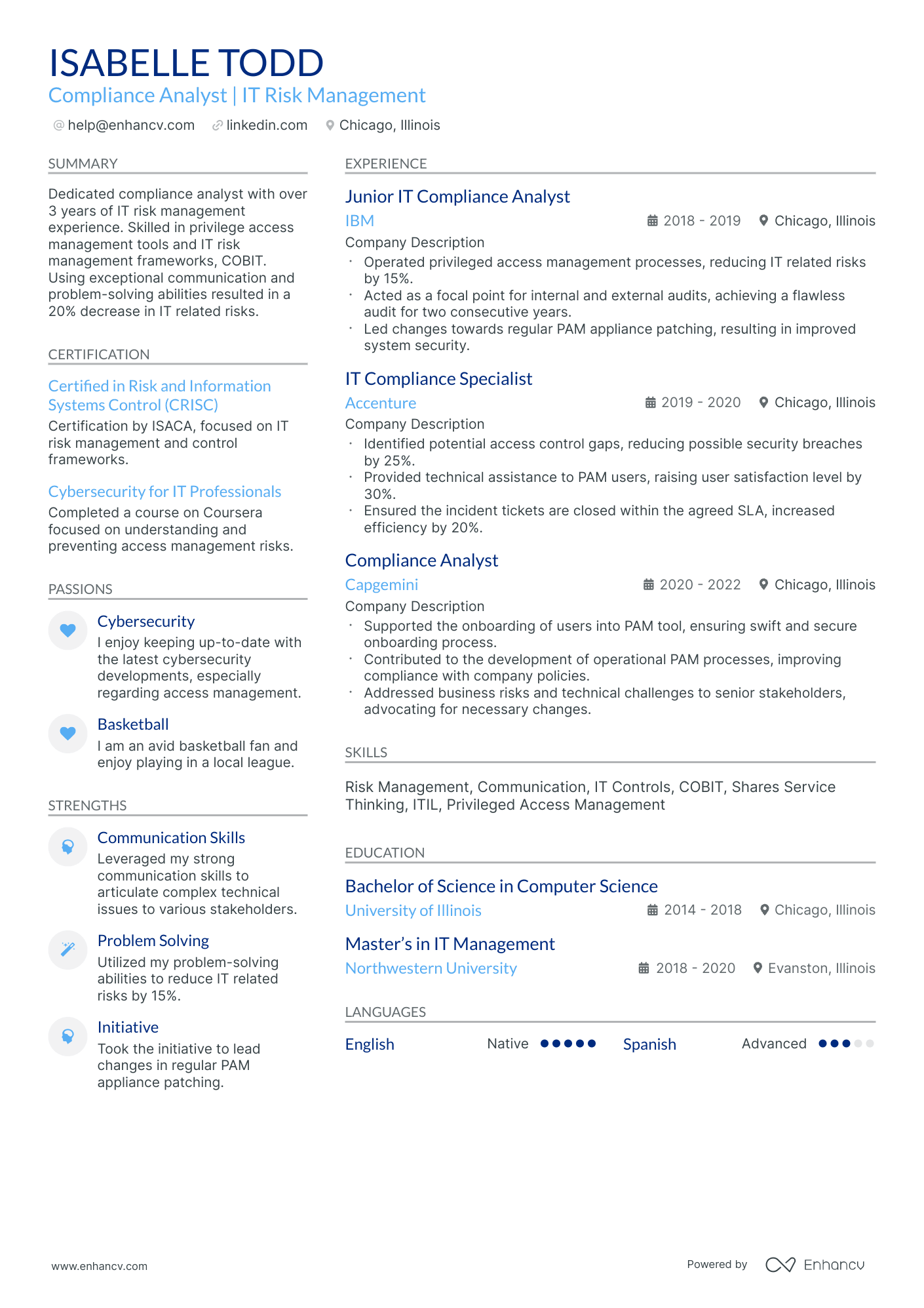Most compliance analyst resume submissions fail because they read like policy summaries, not proof of risk control. In today's crowded market, an ATS filters for specifics, and recruiters scan fast for measurable impact.
A strong resume shows how you reduced risk and improved outcomes. Knowing how to make your resume stand out starts with highlighting audit findings closed, control testing pass rates, regulatory deadlines met, exceptions reduced, and remediation delivered across teams. Include scope, volume, and quality results.
Key takeaways
- Quantify compliance outcomes like audit findings closed, risk reduced, and remediation timelines shortened.
- Use reverse-chronological format for experienced analysts and hybrid format for career switchers.
- Tailor every resume to mirror the job posting's regulatory frameworks, tools, and terminology.
- Pair each skill with a concrete action and measurable result in your experience bullets.
- Place certifications like CAMS or CRCM prominently to signal specialized regulatory expertise.
- Write a three- to four-line summary featuring your domain, tools, and strongest quantified achievement.
- Use Enhancv's Bullet Point Generator to turn routine compliance tasks into recruiter-ready metrics.
Job market snapshot for compliance analysts
We analyzed 449 recent compliance analyst job ads across major US job boards. These numbers help you understand industry demand, top companies hiring, employment type trends at a glance.
What level of experience employers are looking for compliance analysts
| Years of Experience | Percentage found in job ads |
|---|---|
| 1–2 years | 14.3% (64) |
| 3–4 years | 14.7% (66) |
| 5–6 years | 12.2% (55) |
| 7–8 years | 2.2% (10) |
| 9–10 years | 0.9% (4) |
| 10+ years | 1.1% (5) |
| Not specified | 55.0% (247) |
Compliance analyst ads by area of specialization (industry)
| Industry (Area) | Percentage found in job ads |
|---|---|
| Finance & Banking | 68.6% (308) |
| Healthcare | 12.0% (54) |
| Education | 8.5% (38) |
| Government | 3.8% (17) |
| Manufacturing | 3.1% (14) |
Top companies hiring compliance analysts
| Company | Percentage found in job ads |
|---|---|
| Aegon | 4.5% (20) |
| Boeing | 2.9% (13) |
| S&P Global | 2.4% (11) |
Role overview stats
These tables show the most common responsibilities and employment types for compliance analyst roles. Use them to align your resume with what employers expect and to understand how the role is structured across the market.
Day-to-day activities and top responsibilities for a compliance analyst
| Responsibility | Percentage found in job ads |
|---|---|
| Excel | 20.0% (90) |
| Microsoft office | 16.7% (75) |
| Compliance | 16.3% (73) |
| Microsoft excel | 11.6% (52) |
| Word | 10.7% (48) |
| Project management | 9.8% (44) |
| Risk management | 9.6% (43) |
| Data analysis | 8.7% (39) |
| Outlook | 8.5% (38) |
| Powerpoint | 7.8% (35) |
| Ms office | 7.6% (34) |
| Audit | 7.3% (33) |
Type of employment (remote vs on-site vs hybrid)
| Employment type | Percentage found in job ads |
|---|---|
| On-site | 50.8% (228) |
| Hybrid | 31.2% (140) |
| Remote | 18.0% (81) |
How to format a compliance analyst resume
Recruiters evaluating compliance analyst resumes prioritize regulatory knowledge, analytical rigor, and familiarity with frameworks like SOX, AML, or KYC—along with clear evidence of risk identification and remediation outcomes. A clean, well-structured resume format ensures these signals surface quickly during both automated screening and manual review, rather than getting buried under generic summaries or unclear timelines.
I have significant experience in this role—which format should I use?
Use a reverse-chronological format to showcase your deepening expertise across compliance programs, audits, and regulatory environments. Do:
- Lead each role entry with the scope of your compliance responsibility—regulations covered, business units supported, and reporting lines.
- Highlight proficiency with role-specific tools and domains such as GRC platforms (e.g., RSA Archer, MetricStream), transaction monitoring systems, and regulatory filing processes.
- Quantify outcomes tied to risk reduction, audit findings, or process improvements rather than listing duties.
- "Conducted 45+ internal compliance reviews annually across three business lines, identifying 12 policy gaps that led to a revised control framework and a 30% reduction in audit exceptions year over year."
I'm junior or switching into this role—what format works best?
A hybrid format works well, letting you lead with core compliance skills and certifications while still presenting any relevant work or project experience in chronological order. Do:
- Place a focused skills section near the top featuring regulatory knowledge areas (e.g., GDPR, BSA/AML), data analysis tools, and any compliance certifications like CAMS or CCEP.
- Include academic projects, internships, or cross-functional assignments where you performed compliance-adjacent tasks such as policy research, data auditing, or risk assessment.
- Connect every listed skill or project to a concrete action and a measurable or observable result.
- AML transaction monitoring (skill) → Flagged and escalated 150+ suspicious activity reports during a six-month internship (action) → Contributed to a 98% on-time SAR filing rate for the compliance team (result).
Why not use a functional resume?
A functional format strips away the timeline and context recruiters need to evaluate how your compliance knowledge was applied in real work or project settings, making it harder to verify depth of experience.
- A functional format may be acceptable if you're transitioning from a related field (e.g., internal audit, legal, or financial analysis) with no direct compliance job titles, or if you're re-entering the workforce after a gap—but only if every listed skill is tied to a specific project, course, or outcome rather than presented as a standalone claim.
Once you've established a clean, readable layout, the next step is deciding which sections to include and how to organize them for maximum impact.
What sections should go on a compliance analyst resume
Recruiters expect a compliance analyst resume to quickly show your regulatory knowledge, risk judgment, and measurable results. Understanding what to put on a resume helps you prioritize the right details.
Use this structure for maximum clarity:
- Header
- Summary
- Experience
- Skills
- Projects
- Education
- Certifications
- Optional sections: Awards, Publications, Languages
Strong experience bullets should emphasize audit and monitoring scope, risk reduction, regulatory adherence, process improvements, and measurable outcomes.
Is your resume good enough?
Drop your resume here or choose a file. PDF & DOCX only. Max 2MB file size.
Now that you’ve outlined the key resume components employers expect, focus next on writing your compliance analyst experience section to show how you applied those elements in your work.
How to write your compliance analyst resume experience
The experience section is where you prove you've delivered real compliance work—not just occupied a seat. Hiring managers prioritize demonstrated impact over descriptive task lists, so every bullet should connect a compliance tool, framework, or method to a measurable outcome you personally drove.
Each entry should include:
- Job title
- Company and location (or remote)
- Dates of employment (month and year)
Three to five concise bullet points showing what you owned, how you executed, and what outcomes you delivered:
- Ownership scope: the regulatory programs, compliance monitoring systems, audit cycles, policy frameworks, or business units you were directly accountable for as a compliance analyst.
- Execution approach: the tools, methodologies, and frameworks you relied on to assess risk, conduct investigations, interpret regulations, or implement controls—such as GRC platforms, regulatory databases, or internal audit procedures.
- Value improved: the specific compliance outcomes you strengthened, whether that involved reducing regulatory risk exposure, improving audit readiness, increasing policy adherence rates, or shortening remediation timelines.
- Collaboration context: how you partnered with legal counsel, internal audit teams, business unit leaders, external regulators, or third-party vendors to align compliance objectives across the organization.
- Impact delivered: the tangible results your work produced, framed through risk reduction, cost avoidance, successful examination outcomes, or enterprise-wide process improvements rather than routine activity descriptions.
Experience bullet formula
A compliance analyst experience example
✅ Right example - modern, quantified, specific.
Compliance Analyst
NorthBridge Payments | Remote
2022–Present
Supported a high-volume payments platform serving fintech and small business customers across the United States.
- Led quarterly risk assessments and control testing across KYC (know your customer), AML (anti-money laundering), and transaction monitoring using Jira, Confluence, and SQL sampling—reduced high-risk audit findings by 32% year over year.
- Built and maintained compliance dashboards in Tableau and Excel Power Query from Snowflake and case management exports—cut monthly reporting time from eight hours to two hours and improved data accuracy by 18%.
- Partnered with engineering and product managers to implement policy-as-code checks for sanctions screening and record retention in GitHub and CI pipelines—decreased production exceptions by 41% and improved evidence traceability for audits.
- Managed regulatory exam readiness by standardizing evidence collection in SharePoint and mapping controls to SOC 2 (System and Organization Controls 2) and PCI DSS (Payment Card Industry Data Security Standard)—shortened audit response cycle time by 25% and eliminated repeat requests from auditors.
- Investigated and triaged compliance incidents with human resources, legal, and customer support using root-cause analysis and corrective action plans—reduced recurrence rate from 12% to 5% within two quarters.
Now that you've seen how a strong experience section comes together, let's look at how to adjust those details to match the specific compliance analyst role you're targeting.
How to tailor your compliance analyst resume experience
Recruiters evaluate your compliance analyst resume through both human review and applicant tracking systems (ATS), so tailoring your resume to the job description is essential. Tailoring ensures your most relevant qualifications surface quickly during both screening methods.
Ways to tailor your compliance analyst experience:
- Mirror the exact regulatory frameworks and standards listed in the posting.
- Match compliance monitoring tools or software the employer names.
- Use the same terminology for audit processes and risk methodologies.
- Reflect specific KPIs or success criteria the job description references.
- Highlight relevant industry experience such as financial services or healthcare.
- Emphasize policy development or remediation workflows the role requires.
- Include collaboration with legal or operational teams when mentioned.
- Align your reporting and documentation practices with stated expectations.
Tailoring means connecting your real accomplishments to what the employer asks for—not forcing keywords where they don't belong.
Resume tailoring examples for compliance analyst
| Job description excerpt | Untailored | Tailored |
|---|---|---|
| Conduct ongoing monitoring of regulatory changes from SEC, FINRA, and state regulators; update internal policies and procedures accordingly. | Helped keep company policies up to date with current regulations. | Monitored SEC, FINRA, and state regulatory updates on a weekly cadence, revising 35+ internal policies and procedures to maintain full compliance across three business lines. |
| Perform risk assessments using RSA Archer to identify control gaps and recommend remediation plans for enterprise-level compliance programs. | Assisted with risk assessments and helped identify areas for improvement. | Executed quarterly risk assessments in RSA Archer across 12 departments, identifying 18 control gaps and delivering remediation plans that reduced outstanding findings by 40% within six months. |
| Support BSA/AML compliance by reviewing suspicious activity reports (SARs) and conducting enhanced due diligence (EDD) on high-risk customers. | Reviewed reports and performed due diligence on customer accounts. | Reviewed an average of 60 SARs per month and conducted enhanced due diligence on high-risk customers, contributing to a 25% reduction in BSA/AML examination findings year over year. |
Once your experience aligns with the role’s compliance priorities, quantify your achievements to show the scope and impact of your work.
How to quantify your compliance analyst achievements
Quantifying your achievements shows how your work reduced risk, improved audit outcomes, and sped up reviews. Focus on cycle time, accuracy, control coverage, issue closure rates, and measurable risk reduction across policies, audits, and monitoring.
Quantifying examples for compliance analyst
| Metric | Example |
|---|---|
| Audit readiness | "Reduced external audit prep time by 30% by building a SOX evidence tracker in Excel and SharePoint for 120 controls across five business units." |
| Control testing accuracy | "Improved control testing accuracy from 92% to 98% by standardizing sampling and peer review in AuditBoard for 350 quarterly tests." |
| Issue remediation speed | "Cut average remediation cycle time from forty-five to twenty-eight days by implementing weekly Jira workflows and escalation rules for thirty-two findings." |
| Risk reduction | "Lowered high-risk exceptions by 40% by tightening KYC reviews and updating screening rules in World-Check for 18,000 customer records." |
| Monitoring throughput | "Increased transaction monitoring throughput by 25% by tuning alert thresholds and automating case templates in Actimize, clearing 1,200 alerts per month." |
Turn your everyday tasks into measurable, recruiter-ready resume bullets in seconds with Enhancv's Bullet Point Generator.
Once you've crafted strong bullet points for your experience section, you'll want to apply that same precision to showcasing the hard and soft skills that define your compliance expertise.
How to list your hard and soft skills on a compliance analyst resume
Your skills section shows you can interpret regulations, test controls, and reduce risk, and recruiters and ATS scan this section to confirm role fit fast—aim for a hard-skill-heavy mix supported by compliance-specific soft skills. compliance analyst roles require a blend of:
- Product strategy and discovery skills.
- Data, analytics, and experimentation skills.
- Delivery, execution, and go-to-market discipline.
- Soft skills.
Your skills section should be:
- Scannable (bullet-style grouping).
- Relevant to the job post.
- Backed by proof in experience bullets.
- Updated with current tools.
- Above experience if you're junior or switching careers.
- Below experience if you're mid/senior with strong achievements.
Hard skills
- Regulatory compliance monitoring
- Risk and control assessments
- Internal controls testing
- Audit support and readiness
- Policy and procedure drafting
- Compliance monitoring plans
- Case management workflows
- Third-party risk management
- Know Your Customer (KYC), Anti-Money Laundering (AML)
- Sanctions screening, alerts triage
- SQL, Excel, Power BI
- GRC platforms: RSA Archer, ServiceNow
Soft skills
- Translate regulations into controls
- Write clear, testable policies
- Document decisions and evidence
- Escalate risk with context
- Ask precise, audit-ready questions
- Partner with legal and HR
- Align stakeholders on remediation
- Manage competing deadlines
- Challenge gaps diplomatically
- Present findings to leadership
- Maintain confidentiality standards
- Own issues through closure
How to show your compliance analyst skills in context
Skills shouldn't live only in a bulleted list on your resume. Explore common resume skills to ensure you're not overlooking competencies that recruiters expect.
They should be demonstrated in:
- Your summary (high-level professional identity)
- Your experience (proof through outcomes)
Here's what strong, skills-rich entries look like in practice.
Summary example
Compliance analyst with eight years in financial services, skilled in BSA/AML monitoring, risk assessments, and regulatory reporting using Actimize and SQL. Led a remediation program that cut audit findings by 35% across three business units.
- Reflects senior-level experience clearly
- Names industry-specific tools and frameworks
- Quantifies impact with a strong metric
- Signals cross-functional collaboration skills
Experience example
Senior Compliance Analyst
Bridgeport Financial Group | Charlotte, NC
March 2019–August 2024
- Partnered with legal and operations teams to overhaul AML transaction monitoring rules in Actimize, reducing false positives by 42%.
- Conducted quarterly risk assessments using SQL-driven data analysis, identifying control gaps that prevented $1.2M in potential fines.
- Developed and delivered compliance training for 120 employees, improving policy adherence scores by 28% within six months.
- Every bullet includes a measurable outcome.
- Skills surface naturally through real achievements.
Once you’ve demonstrated your compliance analyst skills through targeted examples, the next step is learning how to build a compliance analyst resume with no experience so those examples still read as credible and relevant.
How do I write a compliance analyst resume with no experience
Even without full-time experience, you can demonstrate readiness through:
- Compliance coursework with case studies
- Internship in risk or audit
- Student compliance club leadership
- Regulatory research memos for class
- Mock audit and control testing
- Data analysis projects in Excel
- Volunteer policy review for nonprofit
- Certifications: CAMS, CRCM, CIPP
If you're building a resume without work experience, focus on:
- Regulatory frameworks you've applied
- Evidence-based risk assessments
- Controls testing and documentation
- Tools: Excel, SQL, Tableau
Resume format tip for entry-level compliance analyst
Use a hybrid resume format because it highlights compliance analyst skills and projects first, while still showing education and any related roles. Do:
- Lead with a skills summary tied to regulations.
- Add two to three compliance analyst projects.
- Quantify findings, coverage, and error rates.
- List tools used in each project.
- Include relevant certifications and coursework.
- Built an Excel-based compliance testing tracker for a mock audit, sampled 120 transactions, flagged 18 exceptions, and reduced recheck time by 25%.
Even without direct experience, your education section can demonstrate the foundational knowledge and relevant coursework that qualify you for a compliance analyst role.
How to list your education on a compliance analyst resume
Your education section helps hiring teams confirm you have the foundational knowledge needed for a compliance analyst role. It validates your academic background quickly.
Include:
- Degree name
- Institution
- Location
- Graduation year
- Relevant coursework (for juniors or entry-level candidates)
- Honors & GPA (if 3.5 or higher)
Skip month and day details—list the graduation year only.
Here's a strong education entry tailored to a compliance analyst resume.
Example education entry
Bachelor of Science in Finance
Georgetown University, Washington, D.C.
Graduated 2021
GPA: 3.7/4.0
- Relevant Coursework: Financial Regulation, Corporate Governance, Risk Management, Business Ethics, and Anti-Money Laundering Frameworks
- Honors: Dean's List (six semesters), Beta Gamma Sigma Honor Society
How to list your certifications on a compliance analyst resume
Certifications show your commitment to learning, your proficiency with compliance tools, and your knowledge of current regulations that affect a compliance analyst role. Include:
- Certificate name
- Issuing organization
- Year
- Optional: credential ID or URL
- Place certifications below education when your degree is recent and your certifications support it without being your strongest qualification.
- Place certifications above education when they are recent, highly relevant, or required for the compliance analyst roles you target.
Best certifications for your compliance analyst resume
Certified Regulatory Compliance Manager (CRCM) Certified Anti-Money Laundering Specialist (CAMS) Certified Compliance and Ethics Professional (CCEP) Certified Information Systems Auditor (CISA) Certified Fraud Examiner (CFE) ISO 37301 Compliance Management Systems Lead Auditor Certified Risk and Compliance Management Professional (CRCMP)
Once your credentials are positioned to validate your compliance expertise, shift to your compliance analyst resume summary to highlight that value upfront.
How to write your compliance analyst resume summary
Your resume summary is the first thing a recruiter reads. A strong one instantly signals you're qualified for the compliance analyst role.
Keep it to three to four lines, with:
- Your title and years of relevant compliance experience.
- The domain or industry you specialize in, such as banking, healthcare, or fintech.
- Core tools and skills like risk assessments, regulatory frameworks, or audit software.
- One or two quantified achievements that prove your impact.
- Soft skills tied to real outcomes, such as cross-team communication that reduced audit delays.
PRO TIP
At the compliance analyst level, emphasize technical skills, relevant tools, and early measurable contributions. Highlight familiarity with specific regulations like SOX, AML, or GDPR. Avoid vague phrases like "detail-oriented professional" or "passionate about compliance." Replace them with concrete results and specific expertise.
Example summary for a compliance analyst
Compliance analyst with three years of experience in AML and BSA monitoring within banking. Conducted 200+ risk assessments using Actimize, reducing false positives by 30%. Collaborated with legal teams to streamline SAR filing workflows.
Optimize your resume summary and objective for ATS
Drop your resume here or choose a file.
PDF & DOCX only. Max 2MB file size.
Now that your summary effectively communicates your compliance expertise, make sure your header presents the essential contact and professional details recruiters need to reach you.
What to include in a compliance analyst resume header
A resume header lists your key identity and contact details, boosting visibility, credibility, and fast recruiter screening for a compliance analyst role.
Essential resume header elements
- Full name
- Tailored job title and headline
- Location
- Phone number
- Professional email
- GitHub link
- Portfolio link
Including a LinkedIn link helps recruiters verify experience quickly and supports screening.
Don't include a photo on a compliance analyst resume unless the role is explicitly front-facing or appearance-dependent.
Match your header job title and headline to the posting's wording, and keep every link current, professional, and easy to scan.
Example
Compliance analyst resume header
Jordan Taylor
Compliance Analyst | AML, KYC, and Regulatory Reporting
Chicago, IL
(312) 555-78XX
your.name@enhancv.com
github.com/yourname
yourwebsite.com
linkedin.com/in/yourname
Once your contact details and role identifiers are set, add targeted optional sections to strengthen your compliance analyst resume and support the information in your header.
Additional sections for compliance analyst resumes
When your core sections don't fully capture your qualifications, additional sections can strengthen your credibility and set you apart from other candidates.
Consider adding these sections tailored to the compliance analyst role:
- Languages
- Certifications and licenses
- Professional affiliations and memberships
- Publications and regulatory commentary
- Continuing education and compliance training
- Volunteer experience in governance or ethics
- Conference presentations and speaking engagements
Once you've strengthened your resume with relevant extra sections, the next step is pairing it with a cover letter that gives your compliance expertise even more context.
Do compliance analyst resumes need a cover letter
A cover letter isn't required for a compliance analyst, but it often helps in competitive searches or regulated industries with strict hiring expectations. If you're unsure what a cover letter is or how it complements your resume, it can make a difference when your resume needs context, or when the team values clear risk communication.
Use a cover letter to add context your resume can't show:
- Explain role and team fit by matching your experience to the company's compliance analyst scope, stakeholders, and risk areas.
- Highlight one or two relevant projects or outcomes, including your actions, controls tested, and measurable results.
- Show you understand the product, users, and business context, and how compliance requirements affect workflows and decisions.
- Address career transitions or non-obvious experience by connecting prior work to compliance analyst tasks, tools, and regulatory exposure.
Drop your resume here or choose a file.
PDF & DOCX only. Max 2MB file size.
Once you’ve decided whether submitting one adds value to your application, the next step is using AI to improve your compliance analyst resume so it communicates your qualifications more clearly and efficiently.
Using AI to improve your compliance analyst resume
AI can sharpen your resume's clarity, structure, and impact. It helps tighten language and highlight measurable results. But overuse strips authenticity fast. Once your content is clear and role-aligned, step away from AI entirely. For practical guidance, explore these ChatGPT resume writing prompts tailored for resume improvement.
Here are 10 practical prompts to strengthen specific sections of your compliance analyst resume:
Strengthen your summary
Quantify experience bullets
Tighten action verbs
Align skills section
Clarify certification relevance
Improve project descriptions
Remove redundant phrasing
Refine education details
Fix inconsistent formatting
Tailor for specific roles
Conclusion
A strong compliance analyst resume shows measurable outcomes, role-specific skills, and a clear structure. It highlights audit support, monitoring, reporting, policy work, and risk assessment. It uses precise wording, consistent formatting, and easy-to-scan sections.
Keep your compliance analyst resume focused on results and accuracy to match today’s hiring market. Use relevant keywords, quantify impact, and show steady ownership from analysis through follow-up. This structure helps hiring teams assess fit quickly and confidently.
